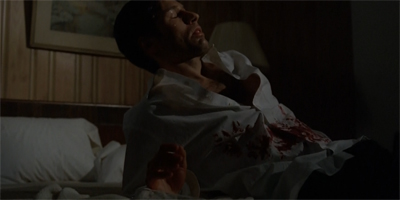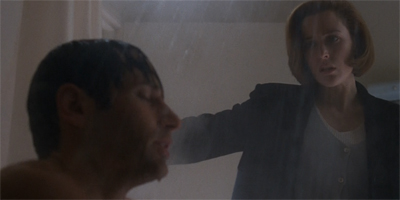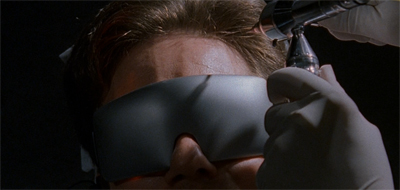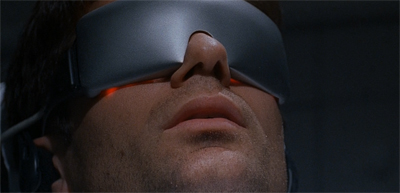This February and March, we’re taking a trip back in time to review the fourth season of The X-Files and the first season of Millennium.
The fourth season of The X-Files is an oddity.
That is particularly true when it comes to the show’s mythology. Not only has any sense of narrative progression stalled after the “to be continued…” hook of Talitha Cumi, the fourth season seems to branch the mythology out in multiple directions that never really get anywhere. Tunguska and Terma introduce a Russian conspiracy that quickly becomes a footnote. Tempus Fugit and Max focuses on private military contractors who are never mentioned again. Memento Mori gives Scully cancer halfway through the season, and the rest of the year tries to catch up.
Demons is an episode that sits rather awkwardly as the penultimate episode of the season. An episode about Mulder undergoing aggressive therapy to recover lost memories seems a little out of place with everything else going on around him. After Memento Mori, you would imagine he would be worried about Scully. After Zero Sum, you imagine he would be wary about putting himself in a vulnerable position. Demons feels very much like it would make a good first season episode, a product of the time when Samantha Mulder was our lead’s primary driving motivation.
Instead, Demons sits awkwardly before the big season finalé with its own clear agenda. Scully’s closing monologue is clearly designed to lead into Gethsemane as almost a four-part season-bridging epic. However, the execution feels a little too haphazard, a little too casual, a little too disorganised. Demons feels less like the lead-in to an earth-shattering story and more like a script designed to plug a gap late in the season.
The fourth season does feel rather disconnected, particularly when examined from a distance. It seemed like there was never any real agreement about the fourth season’s direction. Talking about the ending to Never Again, Glen Morgan has suggested that he and James Wong were writing into an abandoned arc that would culminate in Scully putting Mulder away “for his own good.” This arc never developed, but there was never any clear substitute either. The guiding ethos of the fourth season seemed to be “make it up as you go along.”
There are lots of reasons for this. With the launch of Millennium and the scripting of The X-Files: Fight the Future, it really seemed like Chris Carter was spread too thin. As a result, The X-Files lacked a clear guiding hand in its fourth season. A lot of the episodes seemed to be written with no real thought as to what would happen next – the goal was to get the script in front of the camera. Memento Mori was written when Darin Morgan’s script for the season fell through; Zero Sum was written when Gillian Anderson had to take a week off to work on The Mighty.
In I Want to Believe, R.W. Goodwin concedes that part of what led Chris Carter to greenlight Demons was a sense of desperation:
Early in the 1996-97 season, Bob Goodwin had a vision. “I saw Mulder waking up in a strange place having no idea how he got there,” says the executive producer. “I fleshed it out a bit, told the story to Chris – who needed scripts and had been asking me for a while to write one – and the next thing I knew it was on the schedule.”
If The X-Files was living that close to the wire in its fourth season, it makes sense that the season arc would become disjointed; the priority is to film twenty-four episodes, fitting them together comes later in the year.
As a result, the mythology of the fourth season is somewhat distorted. This is a season where the show spontaneously decided to give its lead actress cancer because they had no script for that production slot. Sitting at the centre of the season, Memento Mori exerts a strange gravity over the episodes around it. It is an episode that informs and colours the rest of the season. “Scully has cancer!” is such a dramatic headline that it is hard to completely drown out when dealing “reanimated killer Jewish fiancée!” or “invisible Vietnam veteran assassin!”
As a mythology episode, Demons is particularly susceptible to the pull of Memento Mori. It is one thing for a monster-of-the-week story to completely ignore the story about how alien abduction gave Scully brain cancer; after all, D.P.O. established that these serialised story elements get put on hold for the episodic adventures. However, Demons is very clearly part of the show’s central mythology story arc. It features the Cigarette-Smoking Man and dwells on the abduction of Samantha Mulder. It seems weird for it to ignore the year’s biggest bombshell.
Of course, R.W. Goodwin plotted and pitched Demons long before Frank Spotnitz, Vince Gilligan and John Shiban frantically drafted Memento Mori; just like Howard Gordon wrote Kaddish before that decision was made and Never Again was filmed before the show revealed Scully had cancer. Because the season’s central mythology was not mapped out in advance, this confusion is inevitable. The X-Files has always adopted an organic and improvisational approach to its storytelling. The fourth season is the first point at which this approach truly falters.
Regardless of the context in which it was written, it is impossible to watch Demons without wondering how this ties back to Memento Mori. The subject matter and plotting doesn’t help. Scully spends most of Demons worried about Mulder’s brain, and David Duchovny spends extended sections of the episode clutching his head painfully. “You are taking a big risk, Mulder,” Scully advises. “I feel strongly about this.” Mulder replies, “I know you do, but it’s my risk.” It feels like a reversal of some of their conversations in episodes like Elegy.
This inevitably raises a host of awkward questions. Why does Mulder think that now is an appropriate time to subject himself for this? Mulder has never had the strongest impulse control, but this feels particularly reckless. Scully is dying and Skinner is compromised. This is the point at which Mulder needs to be as solid as a rock. There is some great dramatic tension to be had in undermining him when Scully and Skinner need him most, but Demons never hits on that. Mulder chooses to put himself in a vulnerable position.
This is one of the more interesting aspects of a serialised narrative like this. R.W. Goodwin would never have intended for audiences to read Demons in light of Memento Mori, just as Glen Morgan and James Wong never intended for viewers to interpret Never Again based on Memento Mori. The X-Files gets a lot of credit of popularising serialised long-form narrative in prime-time television, but the execution was often clumsy and awkward. Individual elements would seem at odds with one another, as viewers tried to reconcile them.
In some respects, this suggests that the construction of continuity is something independent of Chris Carter or the staff working on The X-Files. While they produce the material, it is the viewer who receives and interprets it. Continuity truly is a collective and participatory culture. As Henry Jenkins argues in Textual Poachers:
To some degree, such extrapolation is what all viewers do in making sense of program information, but, within fandom, it assumes an institutional status; elaborations become part of the program tradition, gain broad circulation and assume the status of accepted “facts” seen as binding not only on fans but on the program produces as well.
Many fan discussions develop and elaborate these meta-textual constructs, consolidating the information the series explicitly provided and offering speculations and extrapolations to better explain the motivation and context of narrative events.
This is certainly an explanation of continuity that runs counter to the understanding of certain fandoms. Richard Arnold, for example, would have roundly rejected this theory as it applied to Star Trek. When Disney secured Star Wars, they actually established a committee to manage the property’s continuity.
Nevertheless, as blasphemous as this idea of continuity might seem to certain strands of fandom, it seems to apply quite heavily to the fourth season of The X-Files. It is quite hard to reconcile various plot threads and character decisions without considerable extrapolation or interpolation from the viewer. While the third season’s mythology fits together quite comfortably, there is considerable elbow grease and super glue required to make every aspect of the fourth season properly line up.
This feels entirely appropriate in the context of Demons. After all, Demons is a story that is explicitly about continuity. It is about Mulder’s internal continuity, his continuity of memory. Demons is fascinated with Mulder’s memory of his childhood, and what those memories inform him. After all, his devotion to the X-files is based primarily on the memory of his sister’s abduction, a memory reconstructed under hypnosis. Mulder has devoted his life to a memory that might have been distorted through decades of repression.
The relationship (and disconnect) between memory and history is one of the big themes of The X-Files. As Graham observes in “Are You Now or Have You Ever Been?”, the show’s motto may be a tad misleading:
“The Truth Is Out There”, most episodes announce in the opening credits. For agents Scully and Mulder, however, the truth usually seems to be “in there”: in the alien tissue and communication devices stored in the bowels of the Pentagon, in the sewers of New Jersey, in the inner rings of ancient trees, in mushrooms grown in a New England basement, in subterranean Arctic ice cores, in trains buried in the New Mexico desert, in the intelligence community’s covert “groups within groups”, and most importantly of all, in the recesses of Fox Mulder’s memory. The series, in fact is premised upon the persistence of this memory.
In The Pilot, it is quickly established that “missing time” is the evidence of alien abduction. Conspiracy exists in gaps in knowledge or memory. The fourth season revisited this idea in Tempus Fugit and Max.
After all, the greatest threat to continuity is “missing time” – holes or absences in the narrative. This applies as much to contemporary American identity as to Mulder’s childhood or to viewership of The X-Files. Tempus Fugit and Max make this explicit; two nine-minute gaps add up to eighteen minutes – the same amount of time missing from the Watergate tapes. So Demons centres around Mulder’s attempts to recover lost time, to fill in the gaps in his memory. Mulder puts himself at risk in order to discover a truth rooted in his own childhood.
This is not the first time that The X-Files has suggested that there are important details lost to memory. Much of the third season was dedicated to the forgotten history of the Second World War. Paper Clip reminded viewers about the German war criminals relocated to the United States to assist with the space race. Nisei touched on the way that the United States exploited the knowledge of Japanese War Criminals. In Piper Maru, a radioactive secret lurks at the bottom of the Pacific Ocean.
Memory exists distinct from history, because memory allows us to construct narratives and mythologies.This is true of both people and cultures. As David Lowenthal reflects in The Past is a Foreign Country:
Remembering the past is crucial for our sense of identity: … to know what we were confirms that we are. Self-continuity depends wholly on memory; recalling past experiences links us with our earlier selves, however different we may since have become.
In many ways, The X-Files is rooted in the traumas of the seventies – Watergate and Vietnam. As a controversial and divisive moment in American history, Vietnam has been subject to much debate and reinterpretation. The eighteen-minute gap in the Watergate tape is a lingering lacuna in the collective memory.
Since the seventies, memory and history have become entangled. Ronald Reagan developed a reputation as a “master storyteller”, and it has been argued that elements of Reagan’s life even outside his political career are already mythologised. Reagan had a fondness for evoking popular memory, such as during his second Inaugural Address:
History is a ribbon, always unfurling; history is a journey. And as we continue our journey, we think of those who travelled before us. We stand together again at the steps of this symbol of our democracy–or we would have been standing at the steps if it hadn’t gotten so cold. Now we are standing inside this symbol of our democracy. Now we hear again the echoes of our past: a general falls to his knees in the hard snow of Valley Forge; a lonely President paces the darkened halls, and ponders his struggle to preserve the Union; the men of the Alamo call out encouragement to each other; a settler pushes west and sings a song, and the song echoes out forever and fills the unknowing air.
More than any other American President in recent memory, it seemed that Reagan understood the importance of memory and narrative. To pick two examples, Reagan made conscious attempts to re-write the popular memory of Vietnam (“we didn’t lose that war”) and his supporters cultivated the suggestion that Reagan “won” the Cold War.
Memory is a thread that binds. It ties an individual’s sense of self together; what is a person but a chain of linked memories? Similarly, memory serves to bind communities and countries together. When Mulder and Scully confront Doctor Goldstein about his treatment of alien abductees, the doctor refuses be drawn on the validity of the term. Instead, he acknowledges that alien abduction lore consists of “a remarkable collection of shared experiences for those who believe in the phenomena.” If those “shared experiences” do not comprise a reality, then what does?
The X-Files is fascinated by this link between memory, mythology and history. If one accepts the idea that alien abduction serves is a modern American mythology, The X-Files uses that mythology as a vehicle to explore memory and history. Little Green Men revealed that Mulder was watching the Watergate hearings on the night that Samantha was interrupted. The abduction is dated to 27th November 1973; this would have been less than a week after the eighteen-minute gap was discovered.
In fact, memory was a core theme of Stefan Petrucha and Charles Adlard’s run on The X-Files comic book. The run lasted from mid-way through the second season through to the end of the third season, returning time and time again to the links between memory, identity and reality. Experimental and bold, Petrucha and Adlard’s run is frequently overlooked and ignored. In many ways, the duo were ahead of the curve. They even did their own trepanning story long before Demons aired.
Demons suggests that the gaps in memory suggested by The X-Files are ultimately harmful. It is notable that the victims of Doctor Goldstein’s therapy react to their gaps in memories in different ways. Amy Cassandra repeatedly draws pictures of the house where she grew up; the house which she fixates upon. Asked if she knows anything about the house, the woman at the house observes, “I know it’s her favourite subject. It’s the house that she grew up in. Actually, it’s all she paints.” It seems that Amy Cassandra cannot get past that childhood house.
“According to an article I read on Amy, she had begun psychiatric treatment that was effectively recovering her past,” Mulder tells Scully. “The repetitive behaviour exhibited in those paintings that we saw, was an expression of that treatment.” Amy Cassandra’s internal continuity has been violated; her thread of memory has been severed and stitched back together. She fixates on the subject of those memories; of the house where she grew up. Eventually, she visits the house, turning it into the location of her murder suicide with her husband.
Doctor Goldstein’s other patient, Michael Fazekas, develops a diametrically-opposed pathology. While Amy Cassandra could paint nothing but the house, Michael Fazekas seems unable to reconcile his own personal history. He begins to edit his own history, cutting his own face out of pictures. It seems like both Michael Fazekas and Amy Cassandra have issues related to memory and history; Demons seems to suggest that any damage to that thread of memory has the potential to undermine or erode an individual’s sense of self. (Imagine what it does to a country.)
This leads to the climax of the episode, where Mulder’s own experiences push him to the brink of suicide. Sitting with Scully inside his old family home, Mulder finds himself weighing his gun. Although he eventually surrenders himself to Scully, Demons suggests that Mulder has been pushed to the edge. Damage has been done. In many ways, it feels like the last act of Demons is nodding forwards towards Gethsemane, the season finalé. However, the execution feels a little clumsy and stilted.
“I’m concerned that this experience will have a lasting effect,” Scully monologues. “Agent Mulder undertook this treatment hoping to lay claim to his past–that by retrieving memories lost to him, he might finally understand the path he’s on, but if that knowledge remains elusive, and if it’s only by knowing where he’s been that he can hope to understand where he’s going, then I fear agent Mulder may lose his course, and the truths he’s seeking, from his childhood, will continue to evade him… driving him more dangerously forward in impossible pursuit.”

“So you ran off for a weekend without telling anybody, consented to radical neurological procedures from a quack and now claim to have no memory of what happened in those missing two days? Mulder, I just want you to remember that I never do crap like this to you…”
The implication is obvious; the audience is intended to draw a connection between Mulder’s experience here and his larger arc from Gethsemane towards the fifth season. It is certainly more foreshadowing than most X-Files season finalés receive. However, there is something rather awkward about trying to explain a character shift by having your lead character literally drill a hole in his head. Brain-injury-as-character-development is a storytelling device that should be deployed sparingly, if ever.
Once again, there is a sense that The X-Files was rather clumsy when it came to issues of serialisation and arc-building. There are logical and organic ways to build towards Mulder’s major character shift in the fifth season. There are episodes that can be fashioned into a rough and loose character continuity that might explain how Mulder has decided to cast aside years of absolute and unquestioning certainty. Unfortunately, making that argument would mean rejecting the long chain of episodes that don’t support such an arc or a reading.
Ironically, just as Demons suggests that Mulder’s memory betrays him, it seems to concede that The X-Files‘ own memory betrays the show’s plans for the future. Demons foreshadows Mulder’s big character arc across the fifth season and towards Fight the Future, effectively conceding that it does serious damage to the internal continuity of Mulder’s character. Lack of planning and structuring have led to a point where the only way to account for Mulder’s looming character development is to explicitly tinker with his memory.
The decision to bookend both Demons and Gethsemane with the same scene underscores the weirdness of the experience. Both Demons and Gethsemane end with Mulder putting a gun to his head in desperation. Having a lead character contemplate suicide is a big dramatic moment; it is a great way to put the audience on their toes. Even if nobody believes that the show will actually go through with it, it gets people talking. This is a good thing. At the same time, it is a trick that becomes less effective the more often you repeat it.
This is a problem that haunts The X-Files a great deal at this stage. It has been four years; it seems that we have seen just about every possible shocking combination. Mulder and Scully have drawn their guns on each other a number of times; Scully even shot Mulder in Anasazi. Mulder has had Skinner at gunpoint twice in the past two years; in Paper Clip and in Zero Sum. Mulder and Skinner have both threatened the Cigarette-Smoking Man at gunpoint, to no avail. There is a point where this once-shocking imagery is recycled too often.
Although Demons was written and produced before Gethsemane, the two episodes are close enough that the production team should have noted the similarities. Since Gethsemane is the big season-ending cliffhanger, it gets to be the iconic “Mulder contemplates suicide” scene. It was a national talking point in the summer of 1997. As such, despite coming first, Demons must inevitably be the other “Mulder contemplate suicide” scene. It is quite hard to reconcile the repetition.
It is possible to argue that the climax of Demons serves to foreshadow the cliffhanger at the end of Gethsemane. Certainly, having Mulder contemplate suicide before apparently committing suicide helps to amp up the tension. However, nobody watching Gethsemane believed that Mulder had killed himself. After all, David Duchovny was filming Fight the Future that summer. So the echoing of that season-ending sequence feels like another of the out of place elements that reverberate through Demons.
Demons is the first and only script that producer and director R.W. Goodwin wrote for the show. It was his first writing credit in seven years, and his last writing credit to date. While Goodwin has a solid understanding of the show’s core dynamics and cast, his teleplay does feel a little clumsy in places. Most notable, it seems a major coincidence that Michael Fazekas is not only a local police officer, but also one who works in the same building where Mulder is held and chooses to commit suicide in the same holding area.
There are also a few points where Demons seems a little heavy-handed in its symbolism and imagery. Mulder wakes up in “Providence.” It is such a symbolic name that Mulder has to clarify that he means the city in Rhode Island rather than the state of divine intervention. “Providence” is a word well-suited to The X-Files – not only does it refer to the religious undertones of the show’s central arc, but imagery associated with the eye of providence recurs throughout the run and the word is also used as the title of the second part of the show’s last-ever two-parter.
Similarly, the decision to name the victims as “Amy and David Cassandra” feels a little awkward. Cassandra arguably feels more organic as a first name than a surname. It is also loaded with thematic resonance; The X-Files would introduce the character of Cassandra Spender in another episode guest-starring Chris Owen during the fifth season. The name Cassandra is inexorably linked to the Greek prophet cursed to see the future, but doomed to be ignored; applying the name to a character searching for (and fixated on) her past feels a little bit like heavy-handed irony.

“Yes, I am sure that the secondary character I play next year is completely unrelated to this iconic role. Well, one of them, anyway.”
There is a sense that Demons might have worked a lot better in the first or second season of The X-Files. In many ways, Mulder has moved past Samantha as the defining tragedy in his life. Around the time of Conduit, it would be believable that Mulder would drop everything at short notice and drill a hole in his head without telling Scully if he thought it would tell him something new. However, Mulder has evolved past that point. As the character argued in Oubliette, Samantha is not the only thing that defines him as a human being.
So Demons positions itself rather oddly. On the one hand, it feels like a conscious throwback to a more simplistic and less nuanced approach to Mulder as a character. On the other hand, it harks towards Gethsemane and the fifth season more clearly and more confidently than any other episode in the fourth season. At the same time, Demons feels rather divorced from the mythology episodes around it; it feels out of tune with anything else unfolding over the course of the fourth season.
The result is an episode that feels rather like Mulder’s memory flashes; it is jarring and hard to properly contextualise. Nevertheless, it makes quite an impression. Hitting on a lot of the big ideas of the mythology without really saying anything, Demons is a rather strange and bizarre penultimate episode to a season that has largely been rather strange and bizarre.
You might be interested in our other reviews of the fourth season of The X-Files:
- Herrenvolk
- X-tra: Season One (Topps) – Pilot
- X-tra: (Topps) #17 – Thin Air
- Home
- X-tra: (Topps) The Silent Blade
- X-tra: (Topps) #18-19 – Night Lights
- Teliko
- Unruhe
- X-tra: Millennium – Pilot
- The Field Where I Died
- X-tra: Millennium – Dead Letters
- Sanguinarium
- X-tra: (Topps) #23 – Donor
- Musings of a Cigarette-Smoking Man
- X-tra: Millennium – 5-2-2-6-6-6
- Tunguska
- Terma
- X-tra: (Topps) #24 – Silver Lining
- Paper Hearts
- El Mundo Gira
- X-over: The Simpsons – The Springfield Files
- X-tra: (Topps) #25-26 – Be Prepared
- Leonard Betts
- Never Again
- Memento Mori
- Kaddish
- Unrequited
- Tempus Fugit
- X-tra: Millennium – Lamentation
- Max
- Synchrony
- Small Potatoes
- Zero Sum
- Elegy
- Demons
- X-tra: (Topps) #30-21 – Surrounded
- Gethsemane
- X-tra: (Topps) #32 – Crop Duster
- X-tra: Season One (Topps) – Deep Throat
- X-tra: Millennium – Paper Dove
Filed under: The X-Files | Tagged: Arc, continuity, demons, gethsemane, golden thread, history, identity, memory, mulder, mythology, politics, r.w. goodwin, serialisation, suicide, x-files |









































Leave a comment